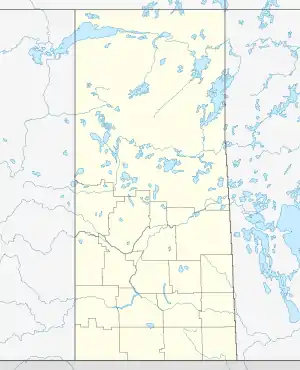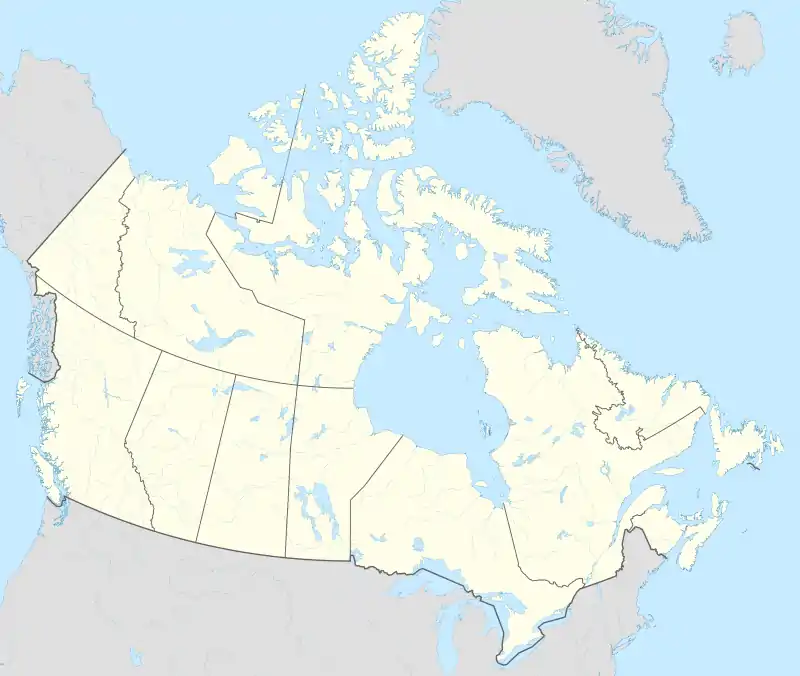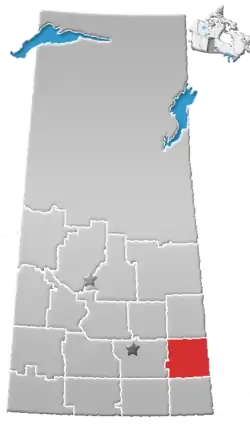Stockholm, Saskatchewan
Stockholm (2016 population: 352) is a village in the Canadian province of Saskatchewan within the Rural Municipality of Fertile Belt No. 183 and Census Division No. 5. It is 72 km (45 mi) south of the City of Yorkton along Highways 9 and 22. The municipal office for the Rural Municipality of Fertile Belt No. 183 is located in Stockholm.[5]
Stockholm | |
|---|---|
Village | |
 Stockholm Location of Stockholm in Saskatchewan  Stockholm Stockholm (Canada) | |
| Coordinates: 50.66°N 102.30°W | |
| Country | Canada |
| Province | Saskatchewan |
| Region | Southeast Saskatchewan |
| Census division | 5 |
| Rural Municipality | Fertile Belt No. 183 |
| Post Office | 1904 |
| Incorporated | 1905 |
| Government | |
| • Mayor | Jason Nichols[1] |
| • Administrator | Lorie Jackson |
| • Governing body | Stockholm Town Council |
| • MP Yorkton—Melville | Cathay Wagantall |
| • MLA Melville-Saltcoats | Warren Kaeding |
| Area | |
| • Total | 1.65 km2 (0.64 sq mi) |
| Population (2016)[2] | |
| • Total | 352 |
| • Density | 206.6/km2 (535/sq mi) |
| Demonym(s) | Stockholmite |
| Time zone | CST |
| Postal code | S0A 3Y0 |
| Area code(s) | 306 |
| Highways | Highway 9 Highway 22 |
| Website | https://stockholmsask.com/ |
| [3][4] | |
History
Named after the capital of Sweden, the village was founded in the 1880s by Swedish settlers. Stockholm incorporated as a village on June 30, 1905.[6] According to a Village of Stockholm commemorative plaque dated July 1, 1995, A J Stenberg and wife Svea named the community.[7]
- Heritage properties
Landmarks in Stockholm include the New Stockholm Lutheran Church, also called the Swedish Evangelical Lutheran New Stockholm Church, which was erected in 1917 by Swedish immigrants.[8]
Demographics
In the 2016 Census of Population conducted by Statistics Canada, the Village of Stockholm recorded a population of 352 living in 168 of its 178 total private dwellings, a 3.1% change from its 2011 population of 341. With a land area of 1.65 km2 (0.64 sq mi), it had a population density of 213.3/km2 (552.5/sq mi) in 2016.[11]
In the 2011 Census of Population, the Village of Stockholm recorded a population of 341, a 5.6% change from its 2006 population of 323. With a land area of 1.65 km2 (0.64 sq mi), it had a population density of 206.7/km2 (535.3/sq mi) in 2011.[12]
Media
From 1997 to 2007, Jody Herperger operated an FM radio-rebroadcaster CFZY-FM for CHOZ-FM (St. John's, Newfoundland and Labrador). The station filled a need for commercial top-40 programming on the FM band. The station was maintained for a number of years after CFGW-FM in Yorkton started commercial broadcasting, and ended transmissions in 2007.
References
- Municipal Directory System
- "2011 Community Profiles". Statistics Canada. Government of Canada. Retrieved 2014-03-20.
- National Archives, Archivia Net. "Post Offices and Postmasters". Archived from the original on October 6, 2006. Retrieved 2014-03-20.
- Government of Saskatchewan, MRD Home. "Municipal Directory System". Archived from the original on January 15, 2016. Retrieved 2014-03-20.
- Saskatchewan Municipal Database Archived January 15, 2016, at the Wayback Machine
- "Urban Municipality Incorporations". Saskatchewan Ministry of Government Relations. Archived from the original on October 15, 2014. Retrieved June 1, 2020.
- https://stockholmsask.com/history/
- New Stockholm Lutheran Church Archived 2014-03-23 at the Wayback Machine
- "Saskatchewan Census Population" (PDF). Saskatchewan Bureau of Statistics. Archived from the original (PDF) on September 24, 2015. Retrieved May 31, 2020.
- "Saskatchewan Census Population". Saskatchewan Bureau of Statistics. Retrieved May 31, 2020.
- "Population and dwelling counts, for Canada, provinces and territories, and census subdivisions (municipalities), 2016 and 2011 censuses – 100% data (Saskatchewan)". Statistics Canada. February 8, 2017. Retrieved May 30, 2020.
- "Population and dwelling counts, for Canada, provinces and territories, and census subdivisions (municipalities), 2011 and 2006 censuses (Saskatchewan)". Statistics Canada. June 3, 2019. Retrieved May 30, 2020.
